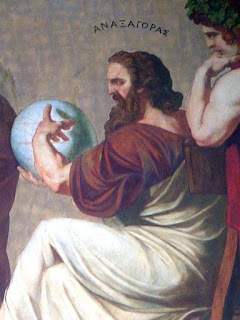Perikles is an ancient Greek who needs no introduction, but a very notable religious and spiritual event surrounding his life is easily passed under the radar.
Perikles came from a very powerful and respected military and political family of Athens. Combined with his intelligence and love for discovery, he was destined for greatness.
When it came time for his education, his parents, for some reason, decided that Anaxagoras should be one of his two teachers. Anaxagoras was the infamous skeptic from Ionia (the coastal region of Asia Minor).
Although, one must remember, that being skeptical of a present situation or belief does not necessarily make one an atheist. Anaxagoras could have believed in the Gods the same as anyone else, even if he didn't buy everything that everyone told him. For example, I can believe the Earth is a God without believing its flat. I can believe the Sun is a God without believing in geocentrism.
Nevertheless, it is safe to say that Anaxagoras was not too fond of oracles and seers, nor did he like to think that natural events were, or could be, the cause of Gods.
When Perikles was a student, the head of a ram was sent to him, probably to his home. But this ram was very distinct in that it only had one central horn upon its head. Presumably, it was taken to have a prophetic meaning, so a Seer was called upon to interpret it. They concluded that the central unified horn meant that Perikles would one day be first and foremost, the most important, in his City's politics.
Anaxagoras, on the other hand, was determined to prove that it meant nothing by opening the ram's skull and showing that the horn was a deformity and nothing more.
While Anaxagoras certainly proved that the horn was a natural malfunction, his hubris made him ignorant, and in the long run, completely wrong. While he was carnally correct, the Seer was visionarily accurate.
Perikles DID become exactly what the Seer had predicted. What Anaxagoras did not understand is that the Gods can use the natural things around us, no matter their state, to relay messages to us.
I'm not trying to tear down on Anaxagoras. I'm simply saying that, far too often, scientists and skeptics such as himself do indeed have a great deal of knowledge, but they also can't see beyond their own noses. Science, especially today, is all physical, and the physical can only see so far. The spiritual, however, has no bounds whatsoever. The scientist is knowledgeable, the spiritualist is wise.
In the Goodness of the Gods,
I'll see you at the next Herm down the road,
Chris Aldridge.
Sources/Credits
*Picture- Anaxagoras by Eduard Lebiedzki. This work is in the public domain because its copyright has expired in countries where copyright is the life of the author plus 70 years. Work can be found here.
*Literary- Aird, Hamish, Pericles, The Rise and Fall of Athenian Democracy, The Rosen Publishing Group, New York, New York, 2004, pp. 24-25.
